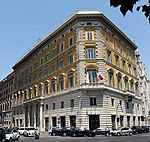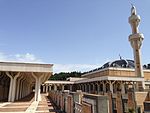Rome Urbe Airport
Airports in ItalyAirports in RomeBuildings and structures in Lazio

Rome Urbe Airport (Italian: Aeroporto di Roma-Urbe, ICAO: LIRU) is a small civilian airport in Rome, situated in the northern part of the city, between Via Salaria and the Tiber River, about 2.7 NM (5 km, 3.1 mi) inside the Greater Ring Road (Italian: Grande Raccordo Anulare or GRA), the circular motorway around the city.
Excerpt from the Wikipedia article Rome Urbe Airport (License: CC BY-SA 3.0, Authors, Images).Rome Urbe Airport
Via Camposampiero, Rome Tor di Quinto
Geographical coordinates (GPS) Address External links Nearby Places Show on map
Geographical coordinates (GPS)
| Latitude | Longitude |
|---|---|
| N 41.951944444444 ° | E 12.498888888889 ° |
Address
Aeroporto di Roma-Urbe
Via Camposampiero
00191 Rome, Tor di Quinto
Lazio, Italy
Open on Google Maps






